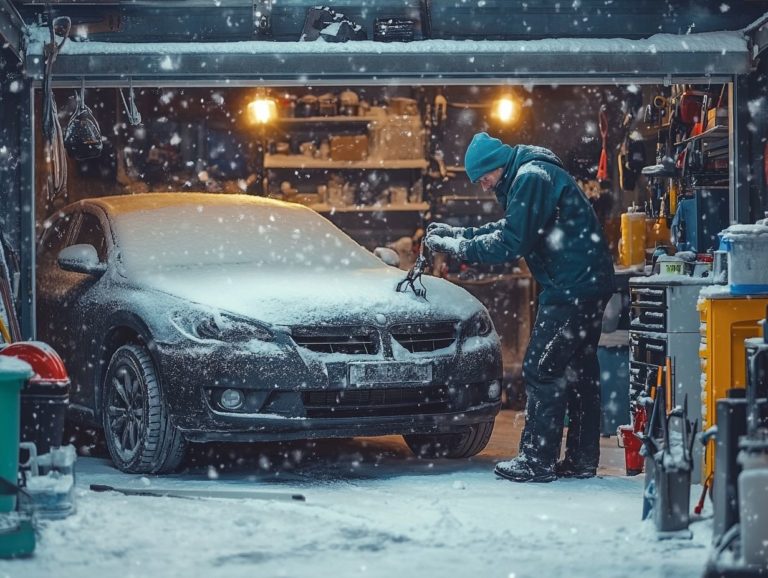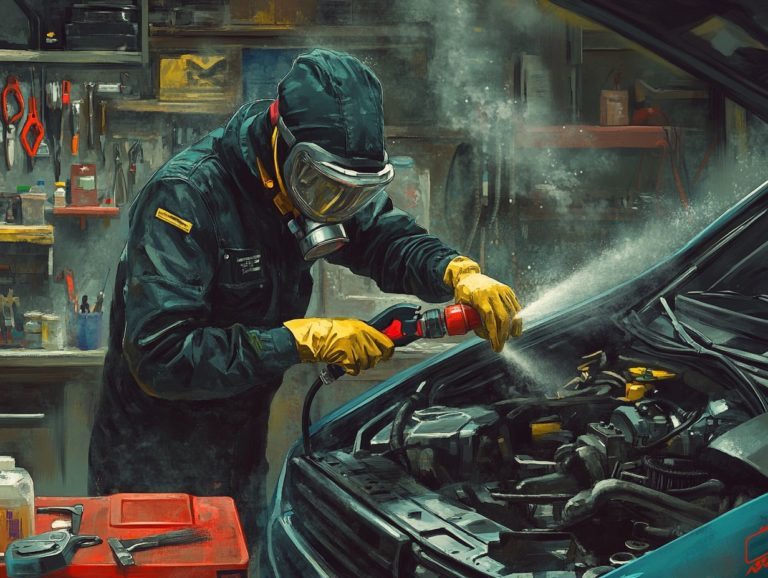How to Avoid Overheating Your Engine
Engine overheating is a prevalent yet serious issue that can lead to costly repairs and unsafe situations. Understanding the factors that contribute to engine overheating, recognizing the signs to watch for, and knowing how to prevent it is essential for you as a vehicle owner.
This article will delve into the various causes and consequences of overheating, identify key warning signs, and provide you with vital maintenance tips. It will also guide you on what steps to take if you encounter an overheating scenario and dispel common myths surrounding this problem.
Stay informed to keep your engine running like a champ!
Contents
- Key Takeaways:
- Understanding Engine Overheating
- Signs of an Overheating Engine
- Preventing Engine Overheating
- What to Do If Your Engine Overheats
- Common Misconceptions About Engine Overheating
- Frequently Asked Questions
- What are some common causes of engine overheating?
- How often should I check my coolant levels?
- What can I do to prevent engine overheating?
- What should I do if my engine starts to overheat?
- Can extreme weather conditions cause engine overheating?
- How can a malfunctioning thermostat cause engine overheating?
Key Takeaways:
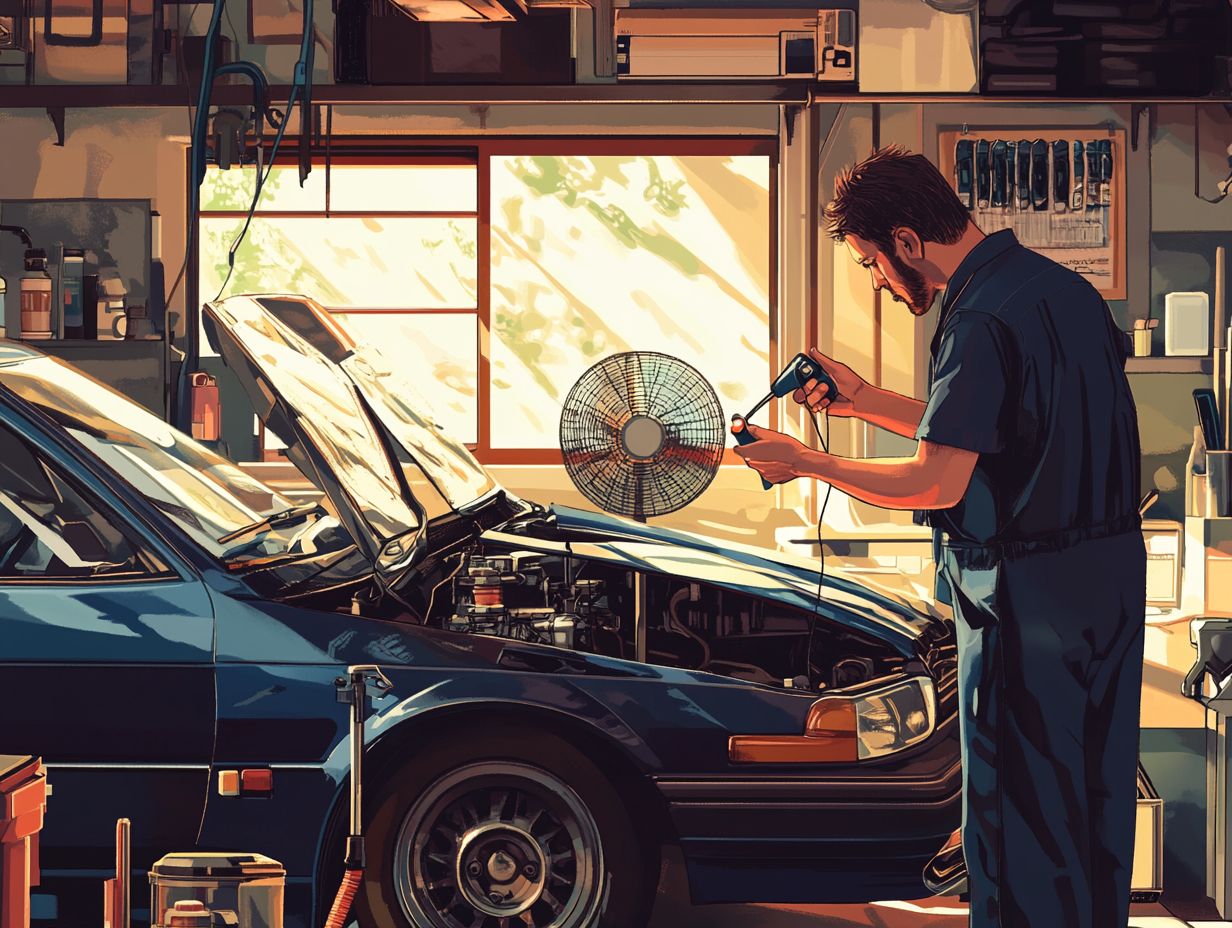
- Keep your engine cool by regularly checking its health!
- Knowing the warning signs of overheating can save you from costly repairs.
- In case of an overheating emergency, follow proper procedures and avoid common misconceptions about fixing the issue.
Understanding Engine Overheating
Understanding engine overheating is essential for you as a car owner. Neglecting this issue can lead to serious mechanical problems and expensive repairs if not addressed promptly.
Typically, engine overheating arises from problems with the coolant system, which plays a vital role in maintaining the engine’s optimal temperature. Several factors, including low coolant levels, coolant leaks, or a faulty thermostat, can contribute to this dilemma.
Driving conditions can also make engine overheating worse, placing extra strain on engine parts and heightening the risk of shutdown or damage. To prevent overheating and ensure your engine performs at its best, it’s crucial to know what to do if your car overheats and to prioritize regular vehicle maintenance.
Causes and Consequences
The causes of engine overheating are numerous, ranging from coolant leaks to low motor oil levels, each carrying its own implications for your vehicle’s performance and safety. For example, a coolant leak can drastically reduce the cooling system’s efficiency, causing your engine temperature to rise. Similarly, low motor oil levels can lead to not enough oil, increasing friction among engine parts and causing them to overheat more rapidly.
These signs of overheating are critical indicators you cannot afford to overlook. Ignoring them could result in significant engine malfunctions. If left unaddressed, you may find yourself facing costly repairs or even needing to replace damaged components, ultimately affecting your vehicle’s lifespan and reliability.
Signs of an Overheating Engine
Recognizing the signs of an overheating engine is crucial for every car owner. Catching these issues early can save you from severe mechanical problems and exorbitant repair costs.
Look out for common symptoms like a rising temperature gauge, steam escaping from under the hood, and warning lights lighting up your dashboard. You might even experience an engine misfire, which can signal internal troubles stemming from excessive heat.
By addressing these overheating indicators promptly, you can save yourself time and money while preventing the risk of a complete engine shutdown.
Identifying Warning Signs
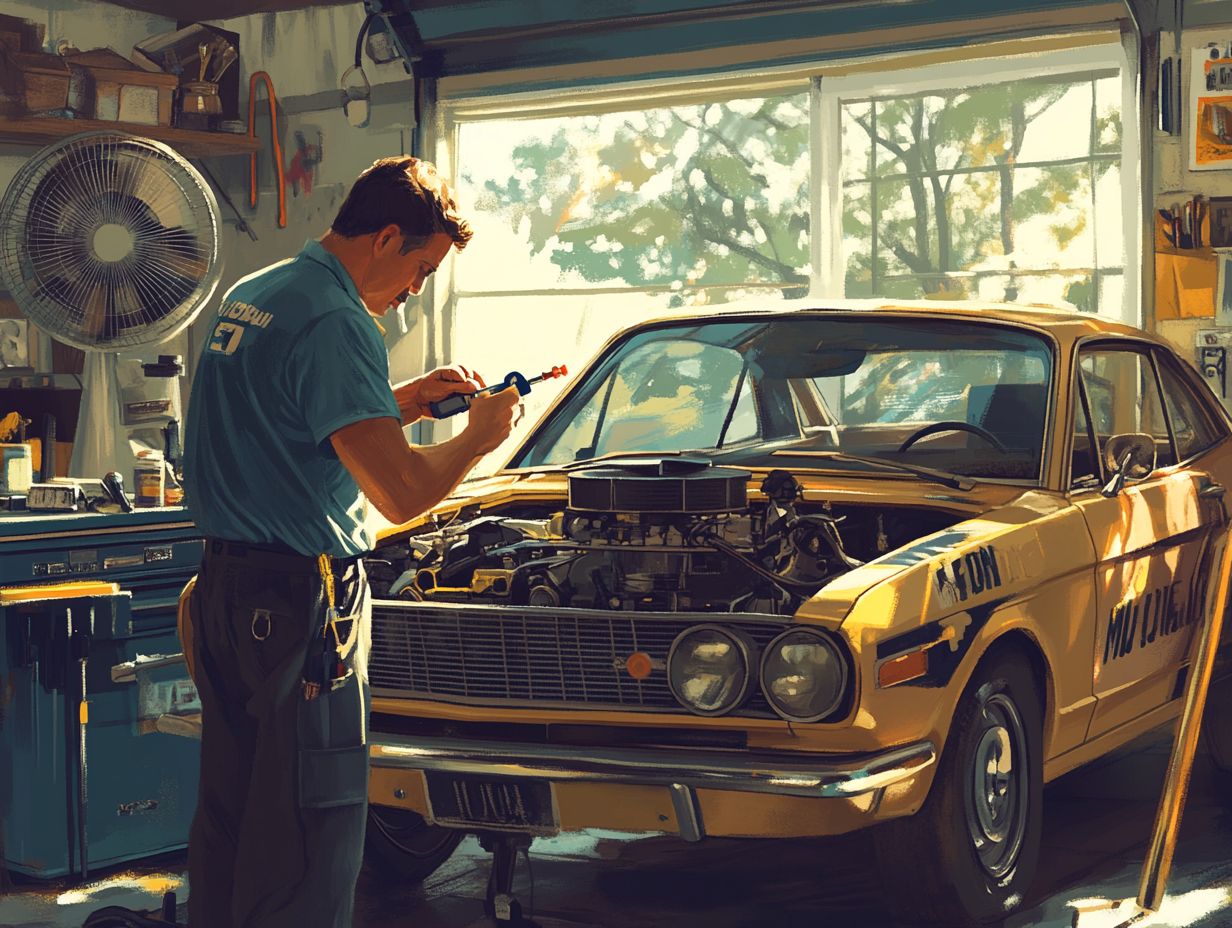
Identifying the warning signs of an overheating engine is crucial for maintaining your vehicle s health and ensuring your safety on the road. These indicators are instrumental in diagnosing potential issues.
Understanding how to interpret readings from the temperature gauge is invaluable. If the needle consistently hovers in the red zone, this is a clear warning to get professional help immediately. When those warning lights illuminate on your dashboard, consider it a timely reminder that your car might require thorough service.
Regular checks and routine maintenance are essential to catch potential problems before they escalate. Consulting with a skilled service technician ensures that you take these warning signs seriously. By prioritizing attention to these details, you can save yourself from costly repairs and enhance your overall safety while driving.
Preventing Engine Overheating
To prevent engine overheating, you must take proactive measures, focusing on regular maintenance and meticulous coolant checks. For detailed steps on how to avoid overheating in your car, ensure your vehicle operates smoothly, no matter the driving conditions you encounter.
Regular Maintenance and Inspection
Routine maintenance and inspection of your cooling system are crucial for preventing overheating issues and ensuring the longevity of your engine’s vital components.
By following a structured maintenance schedule, you can significantly enhance your engine’s performance and reliability. Regularly checking coolant levels and inspecting hoses and radiator functionality helps you identify potential issues before they escalate, contributing to optimal temperature regulation within the engine.
This proactive approach not only protects you from costly repairs in the future but also ensures your vehicle operates at its peak. Consistent attention to your cooling system is essential, as it plays an integral role in maintaining your engine’s health and improving your vehicle’s overall reliability.
What to Do If Your Engine Overheats
Understanding the steps to take if your engine overheats is essential for every car owner. Swift action can avert serious mechanical problems and even the dreaded engine shutdown, safeguarding your investment and ensuring a smooth driving experience.
Emergency Procedures
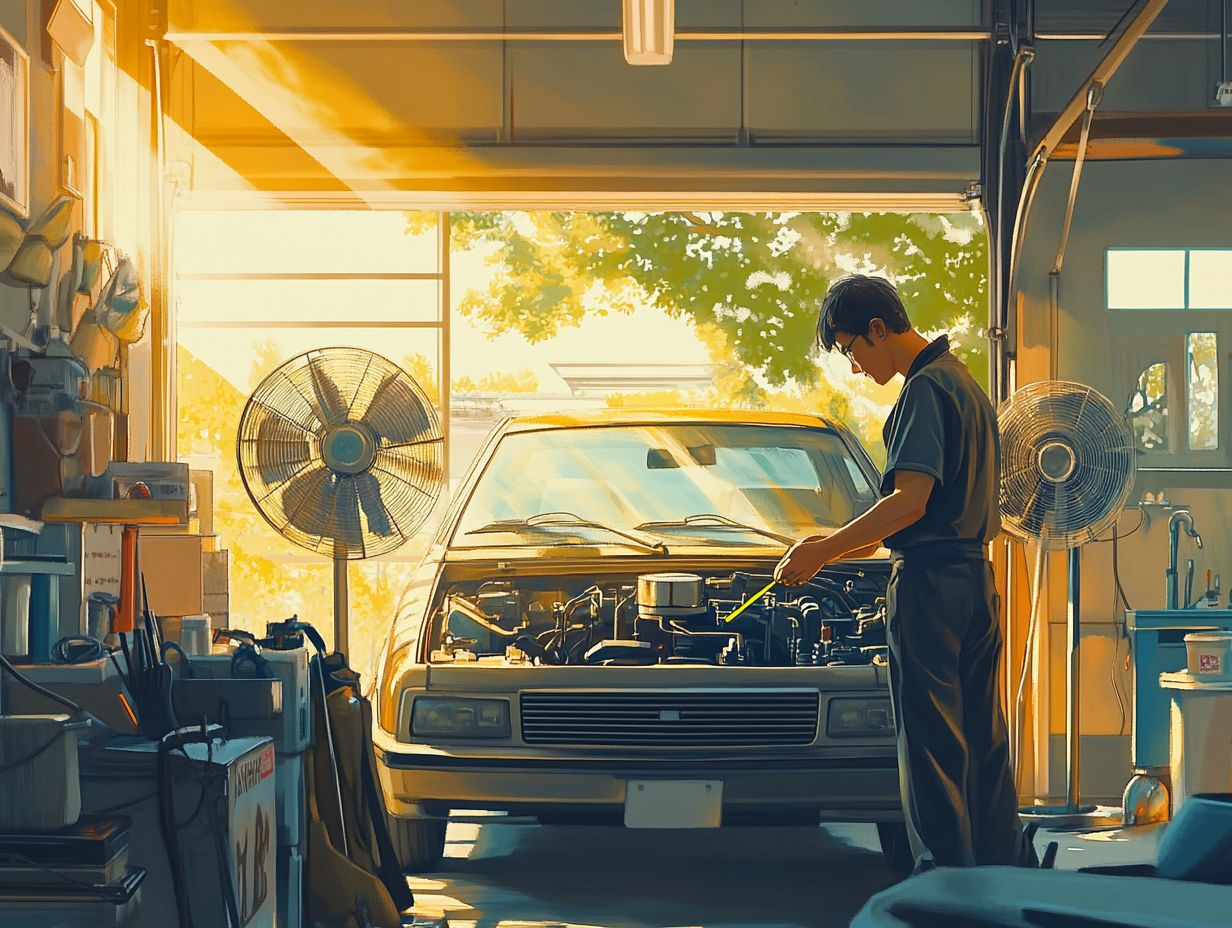
When you find yourself dealing with an overheating engine, the first step is to safely pull over and seek roadside assistance.
Make sure your vehicle is parked on level ground and away from heavy traffic to minimize any potential hazards. Once you re safely parked, turn off the engine to allow it to cool down naturally. This is a critical moment; resist the urge to open the hood right away, as steam or hot air may escape, posing a burn risk.
After waiting a few minutes, take a moment to conduct a visual inspection of the cooling system. Look for any visible leaks, a low coolant level, or signs of corrosion. If the coolant reservoir is empty, that’s a significant warning sign that something’s amiss.
Next, assess the integrity of the radiator and hoses before reaching out to a professional mechanic for a thorough evaluation.
Common Misconceptions About Engine Overheating
You might find that common misconceptions about engine overheating can result in misguided maintenance practices, ultimately impacting your vehicle’s health and performance.
By understanding the truth behind these myths, you can ensure your engine receives the care it deserves, enhancing both its longevity and efficiency.
Debunking Myths and Misinformation
Debunking myths and misinformation about overheating signs is crucial for you as a car owner, enabling you to make well-informed decisions regarding vehicle maintenance and care.
Many drivers mistakenly believe that a rising temperature gauge or illuminated warning lights merely signal trouble for the engine, but that s not always the case. For example, some may think that a coolant leak is a minor issue, when in fact, maintaining proper engine coolant levels is vital for optimal performance. Overlooking these warning signs can lead to severe damage and costly repairs.
There’s also a common misconception that older vehicles are less susceptible to overheating; however, the risk exists across all car models if proper maintenance isn t consistently upheld. Recognizing these myths is essential for ensuring both longevity and reliability in your vehicle.
Frequently Asked Questions
What are some common causes of engine overheating?

Several factors can contribute to engine overheating, including low coolant levels, a malfunctioning thermostat, a leak in the cooling system, or a blocked radiator. It’s important to address these issues promptly to avoid overheating your engine.
How often should I check my coolant levels?
Check your coolant levels at least once a month. Do this more often if you notice changes in your vehicle’s performance.
Low coolant levels can lead to engine overheating. It’s important to keep an eye on them.
What can I do to prevent engine overheating?
To avoid engine overheating, keep up with regular car care tasks such as oil changes and coolant flushes. Regularly check your vehicle’s temperature gauge and address potential issues promptly; for more guidance, refer to how to handle common overheating issues.
What should I do if my engine starts to overheat?
Act quickly if your engine starts to overheat! Pull over to a safe location and turn off your engine.
Let it cool down for at least 30 minutes before attempting to open the hood. Once the engine has cooled, check the coolant levels and inspect for any leaks or other potential issues.
Can extreme weather conditions cause engine overheating?
Yes, both extreme heat and extreme cold can cause your engine to overheat. In hot weather, use your air conditioning sparingly to avoid putting extra strain on your engine.
In cold weather, allow your vehicle to warm up before driving and use antifreeze to prevent freezing in your cooling system.
How can a malfunctioning thermostat cause engine overheating?
The thermostat is a small part that controls how coolant flows in your engine. If it becomes stuck closed, it will prevent coolant from flowing, leading to overheating.
Make sure to have your thermostat checked and replaced if necessary to prevent this issue.
Did you know a well-maintained engine can improve your fuel efficiency?

